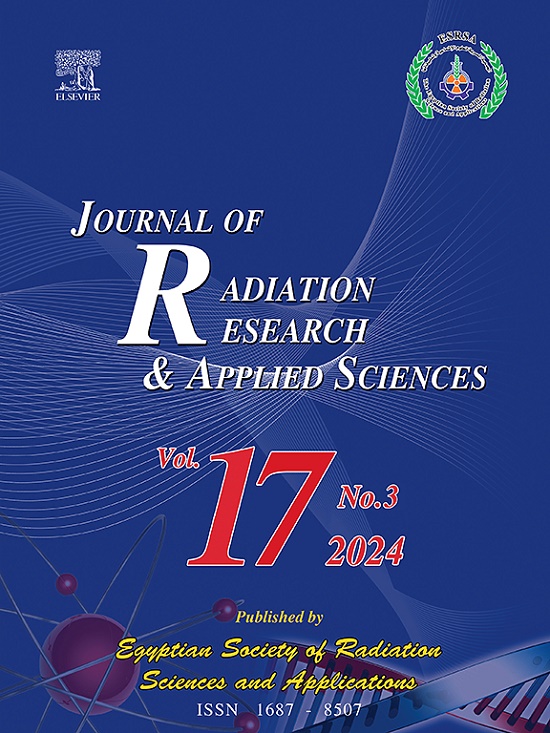Efficacy and safety of recombinant human brain natriuretic peptide combined with sacubitril/valsartan in patients with congestive heart failure and rapid atrial fibrillation based on echocardiographic assessment
IF 2.5
4区 综合性期刊
Q2 MULTIDISCIPLINARY SCIENCES
Journal of Radiation Research and Applied Sciences
Pub Date : 2025-08-28
DOI:10.1016/j.jrras.2025.101919
引用次数: 0
Abstract
Background and objective
Congestive heart failure (CHF) represents the end stage of various primary cardiomyopathies, with rapid atrial fibrillation (AF) being a common complication. This study employed echocardiography to evaluate the efficacy and safety of recombinant human brain natriuretic peptide (rhBNP) combined with sacubitril/valsartan (Sac/Val) in the treatment of CHF with rapid AF.
Materials and methods
A total of 187 patients with AF and CHF were randomized into control group, rhBNP group, Sac/Val group, and combination group. Patients were followed up for six months. Cardiac function parameters, including left atrial diameter (LAD), left ventricular end-diastolic diameter (LVEDD), left ventricular ejection fraction (LVEF), and E-wave to A-wave (E/A) ratio, were assessed via echocardiography. Serological markers-renin, angiotensin II (Ang II), aldosterone (Ald), N-terminal pro-brain natriuretic peptide (NT-proBNP), and soluble suppression of tumorigenicity 2 (sST2) were measured. Adverse reactions and adverse prognostic events were recorded.
Results
Compared to the control group, following treatment, the resting and exercise heart rate (HR), echocardiographic parameters LAD, and LVEDD were significantly reduced (P < 0.05), LVEF and E/A were significantly increased (P < 0.05), and the levels of serological indicators Renin, Ang II, Ald, NT-proBNP, and sST2 were significantly decreased in the rhBNP group, Sac/Val group, and combination group (P < 0.05). The combination group suggested superior echocardiographic parameters, serological indicators, clinical total response rate (95.1 %), and adverse prognosis event rate (4.9 %) compared to the other three groups following treatment (P < 0.05).
Conclusion
Echocardiographic assessment demonstrated that the combination of rhBNP and Sac/Val effectively managed CHF with AF, improved cardiac function, reduced serological factor levels, and exhibited low rates of adverse reactions and poor prognosis events compared to either agent used alone.
基于超声心动图评价重组人脑利钠肽联合苏比利/缬沙坦治疗充血性心力衰竭和快速心房颤动的疗效和安全性
背景与目的充血性心力衰竭(CHF)是各种原发性心肌病的终末期,快速心房颤动(AF)是一种常见的并发症。本研究采用超声心动图评价重组人脑利钠肽(rhBNP)联合苏比利/缬沙坦(Sac/Val)治疗快速AF合并CHF的疗效和安全性。材料和方法将187例房颤合并CHF患者随机分为对照组、rhBNP组、Sac/Val组和联合组。患者随访6个月。通过超声心动图评估心功能参数,包括左房内径(LAD)、左室舒张末期内径(LVEDD)、左室射血分数(LVEF)和E波与A波(E/A)比。测定血清学标志物肾素、血管紧张素II (Ang II)、醛固酮(Ald)、n端前脑利钠肽(NT-proBNP)和可溶性抑制致瘤性2 (sST2)。记录不良反应和不良预后事件。结果与对照组比较,治疗后rhBNP组、Sac/Val组、联合用药组患者静息、运动心率(HR)、超声心动图参数LAD、LVEDD均显著降低(P < 0.05), LVEF、E/A均显著升高(P < 0.05),血清学指标Renin、Ang II、Ald、NT-proBNP、sST2水平均显著降低(P < 0.05)。联合组治疗后超声心动图参数、血清学指标、临床总有效率(95.1%)、不良预后事件发生率(4.9%)均优于其他三组(P < 0.05)。结论超声心动图评估显示,与单独使用任何一种药物相比,rhBNP和Sac/Val联合使用可有效治疗CHF合并AF,改善心功能,降低血清学因子水平,不良反应发生率和预后不良事件发生率低。
本文章由计算机程序翻译,如有差异,请以英文原文为准。
求助全文
约1分钟内获得全文
求助全文
来源期刊

Journal of Radiation Research and Applied Sciences
MULTIDISCIPLINARY SCIENCES-
自引率
5.90%
发文量
130
审稿时长
16 weeks
期刊介绍:
Journal of Radiation Research and Applied Sciences provides a high quality medium for the publication of substantial, original and scientific and technological papers on the development and applications of nuclear, radiation and isotopes in biology, medicine, drugs, biochemistry, microbiology, agriculture, entomology, food technology, chemistry, physics, solid states, engineering, environmental and applied sciences.
 求助内容:
求助内容: 应助结果提醒方式:
应助结果提醒方式:


